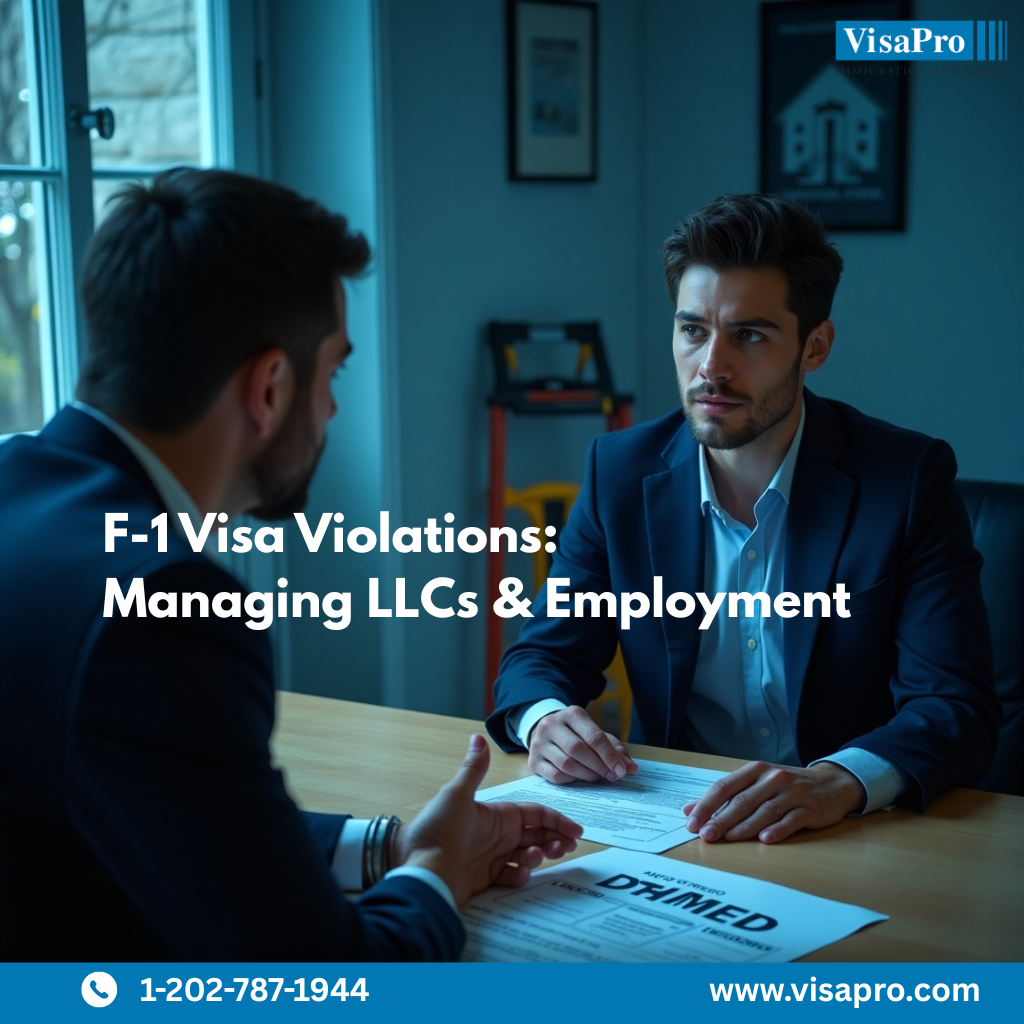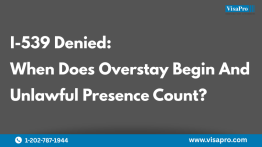Quick Summary:
If you’re on an F-1 visa and are thinking about real estate investing in the U.S., proceed with caution. Immigration laws are strict about what counts as “work” or “employment,” and even passive investment can get complicated. This guide breaks down what’s legally allowed, the fine line you need to walk, and safer visa alternatives like the E-2 treaty investor visa.
Buying and Selling Property On F-1: What You Need To Know
You can own property on an F-1 visa, but actively buying, flipping, or managing real estate for profit may violate immigration laws.
Passive ownership is legal. Actively participating in real estate transactions, running LLCs, or earning income from real estate services could easily cross the line into unauthorized “employment” under immigration rules.
Real estate investing is a tempting way for F-1 students to build wealth or stay in the U.S. longer, but it’s also a legal minefield. USCIS defines “employment” broadly, and any activity where you offer services, time, or labor in exchange for money, even indirectly, can lead to visa violation.
Example 1:
A student purchases a condo in their own name, rents it out using a property manager, and reports the income to the IRS. This is typically considered passive investment. The student does not engage in any “work”, as the property manager does all the “heavy lifting”.
Example 2:
Another student sets up an LLC, scouts and flips properties, negotiates deals, and handles repairs. This is active involvement and would be considered unauthorized work.
VisaPro Tip: If you’re unsure whether your activity crosses the line, consult an immigration attorney before forming a business entity or signing a contract.
What Counts As “Employment” On an F-1 Visa?
Employment is any service provided to a person or business for compensation, including running your own business, even if unpaid. Compensation does not have to be monetary.
The law doesn’t just consider “job offers” to be employment. It includes managing an LLC, or even working on your own startup.
According to U.S. immigration rules:
- Managing or operating a business, regardless of if it earns you money, can be counted as unauthorized work.
- Even unpaid work can raise red flags if it benefits you in any way.
- “Passive investment” means you earn money through appreciation or rental income without providing services.
Case Scenario:
Ahmed, an F-1 student from Egypt, opened a real estate wholesaling company using his cousin’s name. When USCIS later learned he was negotiating contracts and managing operations, his OPT application was denied, and removal proceedings were initiated.
Checklist: Red Flags That May Be Considered Employment
- Actively finding properties or negotiating deals
- Collecting rent or managing tenants
- Managing renovations or contractors
- Drawing a salary
- Marketing or advertising services
If any of these apply to you, you may be risking your F-1 status.
Starting A Business On F-1 Visa: What’s Allowed and What’s Not
Starting a business on F-1 visa is not expressly prohibited, but active involvement or earning income from the business is usually a violation.
You can technically be a passive investor or founder, but you can’t run the business day-to-day or manage the activities of the business or investment. Many students set up an LLC on F-1 visa assuming it’s legal, but managing the company can get you into serious trouble.
Real-Life Example:
Mira, on an F-1 visa from India, formed a Delaware LLC to invest in short-term Airbnb rentals. She never cleaned, marketed, or managed the properties herself. Instead, she hired a management firm. She reported the income on her tax return, and USCIS never raised concerns. But her roommate, who did the same thing and handled guest communications and bookings herself, was denied a future visa due to unauthorized work.
What You Can Legally Do:
- Form an LLC as a passive investor
- Hire a manager or real estate firm to run the day-to-day activities
- Report your income properly to the IRS
What You Can’t Do:
- Work in or for the business
- Make business decisions or direct operations
- Pay yourself a salary or take distributions as compensation

Is Setting Up An LLC on F-1 Visa Safe?
Forming an LLC on F-1 visa is legal, but using it to run a business or earn income may jeopardize your immigration status.
Many students create LLCs thinking it’s a workaround, but if USCIS sees that you’re working through your LLC, even indirectly, you’re at risk of violating your status.
Scenario:
Leo, an F-1 student from Brazil, used his LLC to buy distressed properties and resell them at a profit. He hired contractors but coordinated the work and handled sales. During an OPT application review, USCIS flagged his real estate tax filings, and denied the OPT based on unauthorized employment.
Tips:
- Never list yourself as the “managing member” or CEO
- Use a U.S. citizen or green card holder as your LLC operator, with proper legal agreements
- Avoid transferring funds from the LLC to your personal account for anything other than documented passive investment returns
Better Alternative: Real Estate Investment Through E-2 Visa
If you want to actively manage real estate, the E-2 visa allows you to do so legally, provided you’re from a treaty country.
The E-2 visa is designed for entrepreneurs and investors from treaty countries who want to operate a U.S. business. Unlike F-1, it allows you to actively run your real estate company, and even bring your spouse and kids.
Why E-2 Makes Sense for Real Estate Investors:
- You can legally manage, buy, sell, and profit from real estate deals
- You can operate through an LLC and be hands-on
- Spouses are authorized to work in the U.S.
- You can still pursue studies as long as its incidental to managing your investment
Case Study:
VisaPro helped a Pakistani national studying on an F-1 secure an E-2 visa through a $150,000 investment in a property management business. He now legally operates short-term rentals and flips properties while continuing part-time studies.
Common Treaty Countries for E-2 Eligibility:
Canada, UK, Germany, Pakistan, Egypt, South Korea, Japan, Australia, Turkey
(Not eligible: India, China – explore H-1B, EB-5 or L-1 routes instead)
Final Thoughts: Tread Carefully, Plan Strategically
Just because you can set up an LLC or buy property on an F-1 visa doesn’t mean you should, at least not without understanding the risks.
Immigration law doesn’t just punish intentional violations. Even innocent mistakes, like posting a rental listing, managing a handyman, or flipping a home, can trigger visa denials or worse.
If your goal is long-term real estate investment or entrepreneurship, don’t walk the F-1 tightrope. Consider safer visa paths like E-2, or plan for OPT/CPT-compliant internships with real estate firms. VisaPro has helped hundreds of students and investors successfully transition without jeopardizing their legal status.
Unsure whether your real estate plans are allowed under your F-1 visa?
👉 Schedule a FREE personalized visa assessment with VisaPro’s attorneys today.
FAQ: Buying and Selling Real Estate On F-1 Visa
1.Can I buy a house in the USA on an F-1 visa?
Yes. Owning real estate on an F-1 visa is legal. There’s no restriction on buying a home or property as long as you’re not working in connection with it.
2.Can I rent out property if I’m on F-1 visa?
Yes, if it’s passive. You can rent out property as long as you’re not actively managing tenants or performing services. Use a property manager to avoid risks.
3.Is starting a business on F-1 visa legal?
Starting a business on F-1 visa is not outright unlawful, but you cannot work in or earn money from the business without proper work authorization. Any active involvement can be considered unauthorized employment.
4.Can I form an LLC on F-1 visa for real estate investing?
Forming an LLC on F-1 visa is allowed, but you must not actively manage it. You can be a passive owner or investor, but working through the LLC or drawing a salary is a violation.
5.What visa should I apply for to start a real estate company in the U.S.?
If you want to actively manage or grow a real estate business, consider the E-2 treaty investor visa. It allows full business involvement and is ideal for real estate investors from eligible countries.
Need help understanding what you can and cannot do under your F-1 visa?
Let VisaPro guide you through your best immigration options with clarity and care.
Schedule your FREE Assessment Now.
What VisaPro Customers Are Saying
The US [B-1] Visa has always been a tough ride, and being denied a few times it makes it even worse. But thanks to VisaPro and their meticulous processing I was granted a Visa. I would like to thank you and all the people involved in making this a success. I would like to recommend VisaPro to all those who seek peace of mind and hassle free Visa processing.”




 Manas Bhat, Director Operations, First Houston Mortgage India
Manas Bhat, Director Operations, First Houston Mortgage India



